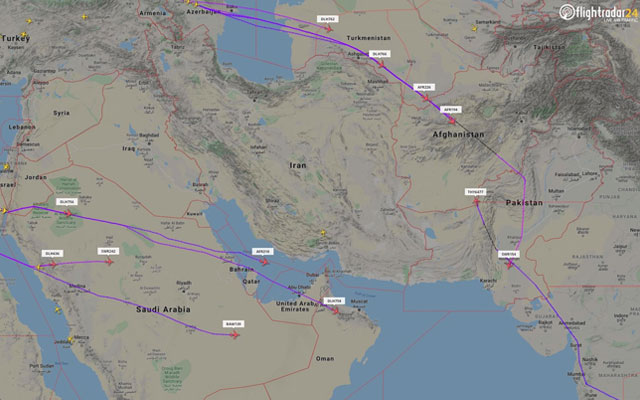Requests for corporate travel risk reports, alternative airlines and a preference for flights that avoid Middle Eastern airspace have spiked as Iran-US tensions mount, noted some corporate travel specialists.
• More travel risk reports being run since the onset of US-Iran conflict
• Perceived safer airlines and air routes are favoured
• Duty of care priorities fuel continued demand for travel risk reporting

Requests for corporate travel risk reports, alternative airlines and a preference for flights that avoid Middle Eastern airspace have spiked as Iran-US tensions mount, noted some corporate travel specialists.
Bertrand Saillet, managing director of FCM Travel Solutions Asia, told TTGmice that his company “observed a 100% increase in the amount of risk reports being run by clients, showing the need for greater insights into risk reporting” at the start of the US-Iran conflict.
Saillet said client concerns deepened after Kyiv-bound Ukraine International Airlines Flight 752 was mistakenly shot down by Iranian missiles in early January, shortly after takeoff from Tehran Imam Khomeini International Airport.
“There has been some corporate queries for alternative carriers and re-routing of flights via alternative safer airspace. Some corporates are taking precautions and have revised their travel policies to prohibit travellers from booking with certain carriers. Many travellers have also been advised to increase their vigilance in at-risk areas, as well as monitor the advice and warnings from foreign government offices,” he elaborated.
For now, FCM is proactively working with clients to take a wide variety of precautions including delaying or cancelling trips to the Middle East, tweaking their policies to only allow travel on certain airlines, as well as trip monitoring, to ensure that those planning to enter the region are supported with additional risk training and information.
While Jo Sully, vice-president & regional general manager, American Express Global Business Travel, Australia & South Asia, refrained from commenting on the impact of Ukraine International Airlines Flight 752’s shot-down on business travel sentiments, she said: “In past instances, companies have removed travel options for staff based upon their own risk assessments. These evaluations are common practice for businesses with frequent international travellers.”
Peter Koh, Asia strategic sourcing manager, Travel & Professional Services, Corning Singapore Holdings, shared that some of his travellers have asked not to fly with Middle Eastern carriers due to real or perceived travel risks.
“Beyond that, there hasn’t been a spike in travel risk enquiries by my travellers. This could be due to the regular travel risk alerts we provide (through our agency International SOS), so our travellers feel sufficiently confident and secure that they are taken care of,” opined Koh.
Confidence in proactive airlines, aviation authorities
Corning Singapore Holdings’ Koh suggested that quick precautionary measures taken by several commercial airlines could have also helped to calm frequent business travellers.
In the aftermath of the Ukrainian passenger jet incident, Singapore Airlines, Vietnam Airlines, Taiwan’s Eva Air, Malaysia Airlines and Australia’s Qantas announced flight route adjustments, diverting routes from Iranian and Iraqi airspace.
Singapore Airlines moved quickly to publish a travel advisory on its website on January 8, stating that “all Singapore Airlines flights to and from Europe have not been flying over the Iranian airspace since 6 January 2020”.
It explained that the “new routes do not significantly change flight times for these flights”, and emphasised that its flights have not operated over Iraqi airspace since 2012.
While the US Federal Aviation Administration and the European Union Aviation Safety Agency have issued their own restrictions and guidelines on airspace usage, Saillet noted that “not all commercial carriers have that choice (of change)”.
“Qatar Airways continues to operate over the airspace of Iran and Iraq due to its navigational limitations over neighbouring Gulf Arab states,” he said.
When asked if the Ukrainian passenger jet incident had made business travellers more aware and inquisitive of the routes their flights take, Koh said: “I have not seen my travellers asking to know what flight paths their airlines are taking. Frankly, there is little use of having such information on hand because the flight paths are determined by the aviation authorities and the airlines. We have to trust that these entities (make the right decisions on behalf of passengers) as they are a lot more aware of travel risks now in such a volatile world.”
Duty of care trumps
While ongoing political conflict around the world has fuelled greater concerns around travel risk, travel management company (TMC) chiefs say clients’ demand for travel risk reporting has also risen on the back of greater awareness around the need to provide duty of care for their travellers.
“Savings and efficiency may be the initial reason why many corporates engage a TMC but at the end of the day, the safety and well-being of the travellers matter just as much,” he said.
Sully agrees, saying: “During times of crisis, it is normal that concerns about business travel are heightened. But traveller safety should always be a company’s main priority. As business travel experts, TMCs work with businesses to achieve that goal with technology and robust travel policies.
Ultimately, travel decisions, such as what airline or aircraft type employees can use, is taken by the company. Safety almost without exception trumps price.”





















